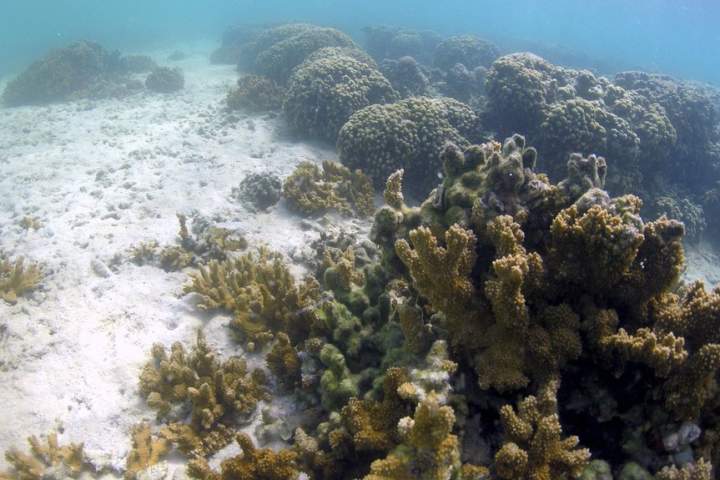Science
Scientists Warn of Coral Reefs’ Irreversible Decline as COP30 Approaches

Global warming is approaching critical thresholds, putting the world’s coral reefs at risk of irreversible die-off. Scientists have identified this alarming trend as the first “tipping point” in climate-driven ecosystem collapse. In the Global Tipping Points report, released on October 30, 2023, by a consortium of 160 researchers, the urgency of the situation is underscored just weeks before the COP30 climate summit, scheduled to take place near the Amazon rainforest in Brazil.
The report indicates that the Amazon rainforest is now at risk of collapse if the global average temperature exceeds 1.5 degrees Celsius due to ongoing deforestation. This revision of the threshold heightens concerns about the future stability of this crucial ecological system. Additionally, the study highlights the potential disruption of the Atlantic Meridional Overturning Circulation (AMOC), a vital ocean current that helps maintain mild winters in northern Europe.
Tim Lenton, an environmental scientist at the University of Exeter and lead author of the report, emphasized the rapidity of these changes. “Change is happening fast now, tragically, in parts of the climate, the biosphere,” Lenton stated. He further noted some progress in renewable energy adoption, indicating that renewables have surpassed coal in electricity generation for the first time this year, according to data from the nonprofit think tank Ember.
As the COP30 summit approaches, scientists are urging nations to intensify efforts to reduce carbon emissions and combat climate change. The urgency of their message is amplified by recent data from U.N. and EU science agencies, which indicate that average global temperatures have already increased by 1.3 to 1.4 degrees Celsius above preindustrial levels.
Record Temperatures and Marine Impact
The last two years have marked the warmest on record, resulting in marine heatwaves that have affected 84 percent of the world’s coral reefs, leading to widespread bleaching and mortality. Coral reefs are essential for sustaining approximately a quarter of marine life, making their health crucial for biodiversity.
For coral ecosystems to recover, experts suggest that global efforts must focus on reducing temperatures to just 1 degree Celsius above preindustrial levels. “The new report makes clear that each year there is an increase in the scope and magnitude of the negative impacts of climate change,” stated Pep Canadell, a senior scientist at the CSIRO Climate Science Centre in Australia.
The current trajectory indicates a potential warming of about 3.1 degrees Celsius this century if existing national policies remain unchanged. Scientists highlight that the situation is becoming increasingly critical, and immediate action is necessary to avert further ecological collapse.
As the world prepares for COP30, the message from the scientific community is clear: urgent and coordinated global action is essential to mitigate the impacts of climate change and protect the planet’s vital ecosystems.
-

 World3 months ago
World3 months agoScientists Unearth Ancient Antarctic Ice to Unlock Climate Secrets
-

 Entertainment3 months ago
Entertainment3 months agoTrump and McCormick to Announce $70 Billion Energy Investments
-

 Science3 months ago
Science3 months agoFour Astronauts Return to Earth After International Space Station Mission
-

 Lifestyle3 months ago
Lifestyle3 months agoTransLink Launches Food Truck Program to Boost Revenue in Vancouver
-

 Technology2 months ago
Technology2 months agoApple Notes Enhances Functionality with Markdown Support in macOS 26
-

 Top Stories7 days ago
Top Stories7 days agoUrgent Update: Fatal Crash on Highway 99 Claims Life of Pitt Meadows Man
-

 Sports3 months ago
Sports3 months agoSearch Underway for Missing Hunter Amid Hokkaido Bear Emergency
-

 Politics2 months ago
Politics2 months agoUkrainian Tennis Star Elina Svitolina Faces Death Threats Online
-

 Technology3 months ago
Technology3 months agoFrosthaven Launches Early Access on July 31, 2025
-

 Politics3 months ago
Politics3 months agoCarney Engages First Nations Leaders at Development Law Summit
-

 Entertainment3 months ago
Entertainment3 months agoCalgary Theatre Troupe Revives Magic at Winnipeg Fringe Festival
-

 Politics1 week ago
Politics1 week agoShutdown Reflects Democratic Struggles Amid Economic Concerns





















